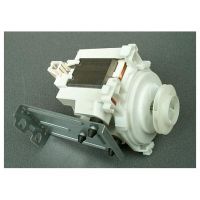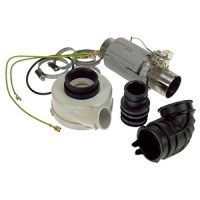Hello
The Whirlpool model 7440/1 dishwasher blown the 20A fuse during operation (a separate line for the 16A dishwasher blew out and then the second one on the staircase for the entire apartment). There was a slight stench of rubber. Four years ago I replaced the wash pump. Now, it's probably time for a heater, but before I buy, give me your opinion:
1. The heater (in the pictures below with the meter), as you can see, has sooty plugs, maybe there was no good transition and the programmer heated the heater too much, hence the fuse in the apartment blown. The meter shows the resistance on the heater plug is OK 25? (range 25-30). There is a transition between, for example, the left pin of the plug through the thermal fuse to the left side of the heater and the same. Resistance on the heater itself (photo 2) also 25? -> conclusion the heater is working, I suppose? If the left or right one-time thermal protection of the heater was to work, its bimetal would remain in the open position, preventing the heater from heating, and here both thermals are short-circuited and there is a transition to the left and right side, of course, without a short circuit in the heater plug itself.
There is also no transition between the ground pins (yellow and green wires) and the heater plug pin, i.e. heater to ground / housing transition. But maybe I'm wrong and the protection works the other way around (when short-circuited, the thermic remains shorted): when measuring these wires, the heater should not be on the resistance meter, e.g. 25? (i.e. like in the plug) only open = no transition. So both thermal protections should be open?
But in this situation, where would there be a 25? resistance in the plug, after all, it is connected in series with the left and right side thermals to the heater wire. This thread forced me to consider such considerations: Link . There, someone said that the heater should be replaced because the resistance of the heater is 25.6? on the heater wires
2. If you suggest a short circuit on the programmer (from the relay side of the HEW heater, then on the programmer plug, the heaters should be more than 25?
3. If I were to buy a new heater, please if anyone knows what is the part number of such a heater with a new type pump for my 7440/1 dishwasher, as in this photo:
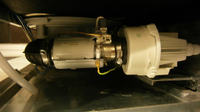
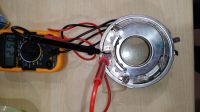
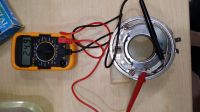
The Whirlpool model 7440/1 dishwasher blown the 20A fuse during operation (a separate line for the 16A dishwasher blew out and then the second one on the staircase for the entire apartment). There was a slight stench of rubber. Four years ago I replaced the wash pump. Now, it's probably time for a heater, but before I buy, give me your opinion:
1. The heater (in the pictures below with the meter), as you can see, has sooty plugs, maybe there was no good transition and the programmer heated the heater too much, hence the fuse in the apartment blown. The meter shows the resistance on the heater plug is OK 25? (range 25-30). There is a transition between, for example, the left pin of the plug through the thermal fuse to the left side of the heater and the same. Resistance on the heater itself (photo 2) also 25? -> conclusion the heater is working, I suppose? If the left or right one-time thermal protection of the heater was to work, its bimetal would remain in the open position, preventing the heater from heating, and here both thermals are short-circuited and there is a transition to the left and right side, of course, without a short circuit in the heater plug itself.
There is also no transition between the ground pins (yellow and green wires) and the heater plug pin, i.e. heater to ground / housing transition. But maybe I'm wrong and the protection works the other way around (when short-circuited, the thermic remains shorted): when measuring these wires, the heater should not be on the resistance meter, e.g. 25? (i.e. like in the plug) only open = no transition. So both thermal protections should be open?
But in this situation, where would there be a 25? resistance in the plug, after all, it is connected in series with the left and right side thermals to the heater wire. This thread forced me to consider such considerations: Link . There, someone said that the heater should be replaced because the resistance of the heater is 25.6? on the heater wires
2. If you suggest a short circuit on the programmer (from the relay side of the HEW heater, then on the programmer plug, the heaters should be more than 25?
3. If I were to buy a new heater, please if anyone knows what is the part number of such a heater with a new type pump for my 7440/1 dishwasher, as in this photo:






